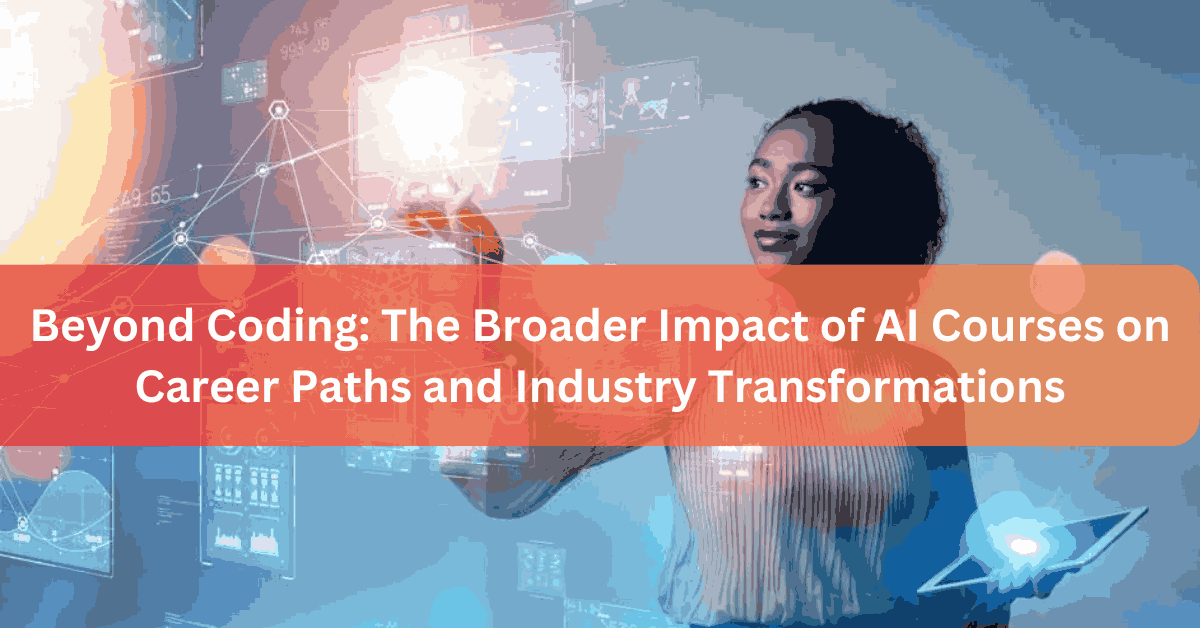Beyond Coding: The Broader Impact of AI Courses on Career Paths and Industry Transformations
Beyond Coding The Broader Impact of AI Courses on Career Paths and Industry Transformations
In the dynamic realm of artificial intelligence (AI), the impact of AI courses extends far beyond coding skills, shaping diverse career paths and driving transformative changes across industries.
As the demand for professionals with AI expertise continues to soar, it is essential to recognize the broader implications of AI education. This article explores the multifaceted impact of AI courses, particularly in the context of pursuing a master’s in artificial intelligence in the USA.
1. Expanding Career Horizons:
AI courses are instrumental in expanding the career horizons of individuals beyond traditional coding roles. While coding remains a crucial skill, AI education delves into areas such as machine learning, natural language processing, and computer vision.
Graduates equipped with a comprehensive skill set find opportunities in roles like AI research, data science, AI ethics, and AI strategy, contributing to the diverse landscape of AI-related careers.
2. Interdisciplinary Applications:
The influence of AI transcends individual disciplines, and AI courses are adapting to foster interdisciplinary applications. Professionals with AI expertise collaborate with experts in fields such as healthcare, finance, environmental science, and more.
This interdisciplinary approach not only enriches the learning experience but also prepares individuals to address complex challenges that require a convergence of AI and domain-specific knowledge.
3. AI in Decision-Making and Strategy:
AI education empowers professionals to leverage AI in strategic decision-making processes. Understanding AI’s role in organisational strategy, risk assessment, and innovation positions graduates to influence key decisions at a strategic level.
Beyond implementation, they become strategic advisors capable of harnessing AI’s potential to drive organisational success and navigate industry transformations.
4. Entrepreneurship and Innovation:
Artificial intelligence courses nurture an entrepreneurial spirit, inspiring individuals to embark on innovative ventures. Graduates with AI expertise often become entrepreneurs who leverage AI technologies to address real-world challenges.
Whether founding AI startups or leading AI-driven initiatives within established organisations, these professionals drive innovation, contribute to economic growth, and shape the future of industries.
4. AI for Social Impact:
AI education emphasises the ethical considerations and societal impact of AI applications. Graduates are equipped with the knowledge to address challenges related to bias, fairness, transparency, and accountability in AI systems.
This ethical foundation empowers individuals to harness AI for social impact, contributing to solutions for issues such as healthcare disparities, climate change, and social justice.
5. Global Perspectives and Collaboration:
Pursuing masters in artificial intelligence in USA offers a global perspective, given the country’s leadership in AI research and industry.
AI courses often incorporate global case studies, collaboration opportunities, and exposure to diverse perspectives. Graduates are well-positioned to collaborate on an international scale, contributing to global advancements in AI and fostering cross-cultural innovation.
6. AI Policy and Governance:
AI education extends beyond technical skills to include an understanding of policy and governance.
Graduates with expertise in AI policy contribute to the development of ethical guidelines, regulatory frameworks, and standards for responsible AI deployment. This aspect of AI education is crucial for shaping the future of AI on a societal and regulatory level.
7. Continuous Learning and Adaptability:
The field of AI is dynamic, with continuous advancements and evolving technologies. AI courses instil a culture of continuous learning, adaptability, and staying updated on emerging trends.
Graduates are not only equipped with foundational knowledge but also possess the agility to navigate the evolving landscape of AI throughout their careers.
Conclusion:
Beyond coding, AI courses have a profound impact on career paths and industry transformations. Pursuing a master’s in artificial intelligence in the USA opens doors to diverse opportunities, from influencing strategic decisions to driving innovation and addressing societal challenges. As professionals embark on their AI education journey, they are not just gaining skills; they are becoming catalysts for positive change in a world increasingly shaped by artificial intelligence.




